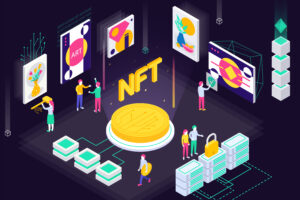
The headlines on cryptocurrency would lead anyone to believe that it is a medium of exchange used primarily by scammers and thieves. In the opening days of 2022, Reuters reported that cryptocurrency crime in 2021 hit an all-time high. In February 2022, New Scientist reported “Cryptocurrency crimes have got too big for the US government to ignore.” In March 2022, a Forbes headline stated succinctly that “Cryptocurrency Fuels Growth of Crime.”
However, statistics paint a different picture. According to The 2022 Crypto Crime Report released by Chainalysis in February 2022, transactions involving illicit crypto addresses represented only 0.15 percent of all cryptocurrency transactions conducted in 2021. While it may be true that hackers and scammers have taken a liking to crypto markets and exchanges, financial crimes committed with cryptocurrency are not as common as one might think.
Why crypto is not optimal for crime
Crypto is built on blockchain technology, which brings a very high level of transparency to transactions. The ledger that records the details of crypto transactions is decentralized. Rather than being kept private and secure by a centralized third party, such as a financial institution or central bank, the blockchain ledger is public. Any transaction involving crypto, legitimate or illegitimate, is open to public scrutiny. Therefore illicit transactions involving crypto are much easier to detect and trace.
In addition to being transparent, blockchain transactions are also immutable. The decentralized ledger is public and distributed, meaning that multiple copies of the blockchain are held by a variety of users on the network. Making changes to a distributed blockchain involves a series of steps that are complicated and extensive to the degree of being viewed as practically impossible. Therefore, illicit transactions involving crypto are much harder to cover up.
Crypto’s digital nature is another factor that makes it a bad choice for financial crimes. Whereas fiat money, such as US dollars, can be exchanged in physical form in a back alley or smokey bar, crypto must be exchanged on a digital platform. Detecting suspicious activity in crypto exchanges is an evolving field, but one that already promises to benefit from AI and machine learning. In general, those attempting to commit illicit transactions with crypto will be closely watched.
Why crypto is not really the ‘Wild West’ of finance
When it comes to regulatory controls, there has been virtual silence in the world of cryptocurrency. This has led to the perception that the crypto realm is a Wild West where lawlessness is the rule. On some levels, there is some truth to that.
For example, “pump and dump” or “rug pull” schemes are common scams involving crypto projects. They involve the launch of a new crypto project with a lot of fanfare that attracts a lot of investors, followed by the disappearance of the founders who take the money and leave the coins valueless. The Securities and Exchange Commission has regulations that make pump and dumps illegal in the stock world, but in the crypto world, no such regulations exist.
Moving forward, most experts agree that regulating cryptocurrency is an important step toward legitimizing the asset. Regarding laws that cover crypto crimes, there are a wide range of criminal statutes that can be used by law enforcement to address crimes involving cryptocurrency. These include statutes related to identity theft, child exploitation, drug trafficking, money laundering, and various forms of fraud.
In February 2022, the US Justice Department announced it had arrested two suspects for alleged conspiracy to launder $4.5 billion in stolen crypto. Upon announcing the charges, Kenneth A. Polite Jr., Assistant Attorney General of the Justice Department’s Criminal Division said, “Today, federal law enforcement demonstrates once again that we can follow money through the blockchain.” In short, the case reveals that committing financial crimes with cryptocurrency is a bad idea.















